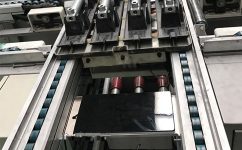
Shanghai Yingxin RFID Reader Helps Industry 4.0 Manufacturing Intelligent Control System
[ad_1]
RFID automatic identification technology will play an increasingly important role in the future “smart factory”, allowing “products” to be automatically identified in real-time in the manufacturing intelligent control system (MES) to achieve flexible production. In China, we call it “Made in China 2025”; in Europe, they call it Industry 4.0, cyber-physical layer system and “Internet of Things”; in the United States, it is an important part of the intelligent manufacturing leadership alliance or industrial network. component. This is the same thing-the fourth industrial revolution and the future visual manufacturing “smart factory”. Experts say that we will see production machines, raw materials and products driven by RFID radio frequency identification technology and IoT communication in the next two decades. In other words, the product will independently find its own path during the production process. The goal is to be highly flexible and individualized mass production will bring cost-effectiveness.

In China, many manufacturing companies have a deep understanding of this and have taken action. A machinery company in Zhejiang is a private enterprise integrating design, development, manufacturing, and sales. It specializes in manufacturing machinery processing and manufacturing special equipment, and produces special light alloy casting products as its core. The company is committed to the research, development and application of light alloy casting technology, and has achieved leapfrog development. It has been listed as a backbone enterprise for exporting foreign exchange by the government. The company is mainly engaged in the three major light alloy manufacturing industries of motorcycle parts, special special shaped parts, and replacing traditional materials with new materials.
In order to improve the efficiency and accuracy of the production line, the company implemented the MES production and manufacturing automatic control system in 2016, using YX9091T high-frequency reader to order additional relays, using anti-metal antennas (the black part in the figure below), combined with PLC, High-frequency electronic tags are installed on the metal parts tray. When the electronic tag-equipped tray passes the high-frequency world, the information of the electronic tag on the tray is recognized, and the PLC controls the flow direction and position of the tray.
Before the deadline, the project has been debugged and started operation. In this regard, the company’s production manager said: “We have conducted long-term research and testing on various technologies for production automation, and finally confirmed the use of RFID radio frequency identification technology, and from the product In terms of the selection, compared with the price-performance ratio of domestic and international brands, we finally chose Shanghai Yingxin’s high-frequency reader. This product satisfies us in terms of cost-effectiveness, stability, and customization requirements. RFID automatic identification technology ensures the smooth operation of large-scale production lines without frequent interruptions. This is the most classic case of Industry 4.0 that we can see.”
RFID technology and Web technology have been independent developments for the past 70 years, but the fourth industrial revolution will see the perfect combination of these two technologies, fully connecting the network and the physical world. We will all experience the tremendous impact of the technological revolution. Since the Internet in the early 1990s has impacted culture and commerce, few people know how to complete the development of RFID radio frequency identification technology and the combination of the Internet to welcome the fourth industrial revolution. In the next two decades, the emergence of smart factories will become an important part.
The above examples prove that today’s companies need to launch new products in due course and apply innovative technologies to practical applications. On the other hand, they must be able to adapt to the smallest batch of production without increasing costs to meet the different needs of customers. Mass customization provides a broad product portfolio without significantly increasing warehousing and logistics costs.
[ad_2]




